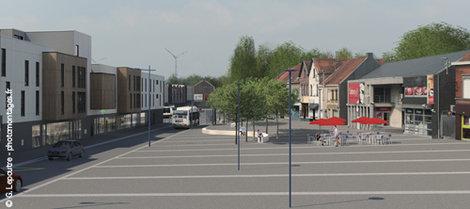Development: the Jacques Delors cross-border square
2013
Cross-border cooperation is a partnership between private or public players, separated by a State border, whose actions have repercussions at regional and local level on either side of the border. Within the European area, 360° mobility across the border, the projects and policies that accompany this mobility in territories close to the border, the progressive cross-border integration that this cooperation builds and which gives rise to cross-border territories, characterise different experiences. To illustrate the results of more than 20 years of cooperation within the Mission Opérationnelle Transfrontalière (MOT), 20 unique experiments conducted by MOT members for the benefit of the inhabitants of cross-border territories were highlighted. Carrying out cross-border development projects or facilities requires an initial phase of defining a common vision of the cross-border territory. Although many border areas have physical continuities (cross-border conurbations, adjoining natural areas, etc.), each area is governed by different regulations, often defined at national level. In Franco-Belgian relations, the issue of development also involves projects with a strong symbolic impact.
To download : place_jacques_delors.pdf (450 KiB)
The « Place transfrontalière Jacques Delors » is a redevelopment project between two municipalities, Halluin (in France) and Menin (in Belgium). Two-thirds of the square is located on the French side and one-third on the Belgian side, and covers 4,650m2 of pedestrian and wooded areas.

The aim of the project is to improve the urban quality and living conditions of residents in the cross-border area by creating a pleasant living environment and a place for cross-border exchanges with joint events. It is helping to make the border disappear by developing this first cross-border public space at the heart of the Lille-Kortrijk-Tournai Eurometropolis.
Since 2008, the Lille-Kortrijk-Tournai Eurometropolis has brought together the authorities of Lille Métropole, Western Hainaut and Southern West Flanders to ensure the development of the cross-border territory and make life easier for its inhabitants. With its own budget, it is responsible for a number of mobility projects. It organises connections between the different systems and develops jobs by promoting contacts between companies and workers on both sides of the border.
The Eurometropolis is also developing a cultural policy that exploits the potential of the border: in 2013, the « 300 years of the border » (Treaty of Utrecht, 1713) will be celebrated to highlight a shared cultural identity.
The development of the Jacques-Delors cross-border square in the municipalities of Menin (Belgium) and Halluin (France) is also a symbol of this shared identity. Showcasing urban continuity across national borders, it is accompanied by new public transport facilities to improve links with the metropolitan centre. Of the €1.3 million required for this project, €430,000 has been funded by the European Union.
The project raises a number of issues, including joint management of the site in terms of safety and parking. Studies have been carried out to this end and to overcome certain regulatory obstacles. The Eurometropole has monitored the preparation of a legal study on the collective management of a cross-border public space in order to answer the questions raised by the managers of this cross-border public space. The Eurometropole’s pioneering approach is intended to serve as « day-to-day instructions » and provide practical solutions in terms of parking, cooperation between emergency services and maintenance. The Place Jacques Delors is to house a Maison du Travailleur transfrontalier (cross-border workers’ centre), one of the key elements of the LKT 2014-2020 Eurometropolis strategy. Linked to the Lys-Tourcoing employment centre, it will bring together the offices, services and documentation useful to French and Flemish cross-border workers.
The square is also considered to be a key location for enhanced cross-border police and customs cooperation since the Tournai II agreements of March 2013.